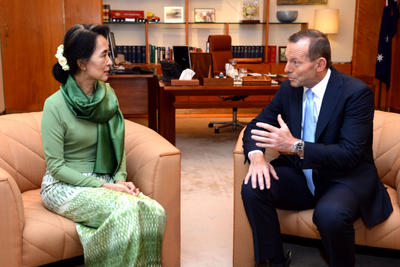The Australians had a hard time getting used to the term ‘Myanmar’, having switched from ‘Burma’ in 2012. ‘Burma’ did occasionally slip out, though they tried hard to stick with the change. During Aung San Suu Kyi’s visit, meanwhile, the Australians again tried not to offend, opting for ‘Myanmar also known as Burma’. Yet the opposition leader seemed to get particularly frustrated by this, at one point responding bluntly that for her it is still ‘Burma’, at least until the people decide otherwise.
So how do we decipher the past year of transition in Myanmar? The reform commitments of Thein Sein’s government have finally earned international recognition, yet the international community is still very much hoping for a day when Aung San Suu Kyi leads the country. For now, regional actors are working closely with the president to help Myanmar escape from its political and economic troubles.
Much has happened in Myanmar in 2013. There are many positive developments, such as the constitutional review process, a possible country-wide ceasefire that could eventually lead to peace talks, and an inflow of multi-billion dollar foreign direct investment for local infrastructure projects. Thein Sein’s visit to the White House in May, Myanmar’s assumption of the ASEAN chairmanship for 2014 and its hosting of the Southeast Asian Games have also boosted the country’s profile. Taken together, these developments put Myanmar in a respectable position in the region. Most remarkably, Myanmar’s transparency rating has also risen. But there are other factors undermining these changes, such as the ongoing Kachin conflict, the recent attack on protesters at a copper mine in northern Myanmar, and communal violence in Rakhine and Meikhtila states, which have all cast a dark shadow on the country’s reform agenda.
Unlike other transitions around the world, Myanmar instigated its reform process through a ‘triple transition’ — in the political, economic and national reconciliation domains — and no one element is any less important than the other. Myanmar still has much to learn from the failures and experiences of other countries, and has not managed to avoid challenges such as land scandals or a clash of the executive and legislative branches — or the rise of ultra-nationalism as a side-effect of transition. But these may just be the challenges the country has to go through in order to make Myanmar — especially its government, political stakeholders and the people — mature and worthy of tasting the fruits of transition.
Looking over the horizon, Myanmar will likely start to emerge politically and economically in 2014, but not without confronting considerable growing pains. Whether or not Aung San Suu Kyi is eligible to become the country’s next president will not be the litmus test for Myanmar’s reform, but rather how she responds if it does not turn out according to her expectations. Securing country-wide peace may be achievable, but it may also be a situation where the country muddles through as everybody, including the international community, tries to take credit. Ethnic parties are gearing up for the 2015 election, but they have forgotten how their ethnic credentials can easily be compromised by Aung San Suu Kyi’s charismatic figure. On the other hand, not everyone continues to hold Aung San Suu Kyi in the same regard, as she has now become a political player, and a polarising one at that. The stakes are also getting higher as the ruling Union Solidarity and Development Party decides on its presidential candidate. In the meantime, much of the country’s non-humanitarian aid assistance is being directly or indirectly channelled toward supporting the 2015 election as a free and fair contest. Everyone has their own agenda.
At least there is one thing that Myanmar can be really proud of. In contrast to its continued below-average performance in the ‘Corruption Perception Index’, it has been named the second-most generous country in the world after the United States, according to the ‘World Giving Index’ 2013. Myanmar holds the position along with Canada and New Zealand, and is ranked far ahead of its peers in the Asian region. Now it must weasel out the corruption that has found a way to sneak into Myanmar’s charitable culture.
Chit Win is a PhD candidate at the School of International, Political and Strategic Studies, College of Asia and the Pacific, Australian National University.
This article is a part of an EAF special feature series on 2013 in review and the year ahead.

